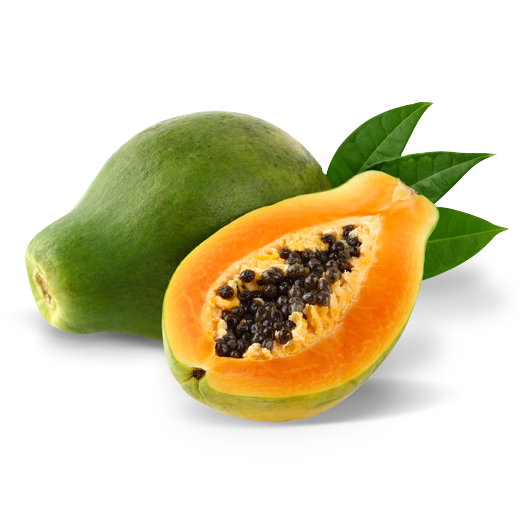Papaya
Carica papaya L. – Caricaceae

Papaya is a popular fruit grown in tropical and subtropical countries. The nutritional and therapeutic qualities of papaya are widely known. The leaves, among other plant components, have been used as therapeutic drugs for several diseases. Papaya leaves contain various bioactive components, including phenolic compounds, flavonoids, alkaloids. These substances help in increasing the antioxidant capacity. Papaya possesses anticancer, anti-inflammatory, antimicrobial and hypoglycemic properties. It also contains the enzyme papain, which helps in the treatment of trauma, allergies and sports injuries by increasing digestive motility and transit time. Many reports have also shown that the leaves contain many bioactive agents such as carpaine and nicotinic acid. The ethanol extract has been shown to contain saponins, cardiac glycosides, anthraquinones and reducing sugars in addition to flavonoids, alkaloids and tannins.

The beneficial effects of the plant are mainly due to the alkaloids, flavonoids, saponins, tannins and glycosides, which possess anti-inflammatory properties. Papaya leaves have been found to contain significant amounts of proteins, alkaloids, amino acids, carbohydrates, steroids and glycosides. The presence of sugars, glycosides, saponins, proteins, amino acids, steroids and terpenoids in measurable amounts has also been reported. Studies have shown the antimicrobial efficacy of fresh and dried leaves of C. papaya against bacteria and fungi. Dried samples from the plant showed significant efficacy against both Gram-negative and Gram-positive bacteria. However, the fresh sample was effective only against Gram-positive bacteria. In the same study, methanolic and aqueous extracts of C. papaya inhibited the activity of Escherichia coli, Staphylococcus aureus and Candida albicans. Based on the research, it was found that the extract of C. papaya leaves possesses antibacterial and cytotoxic effects.
Nanoparticles synthesized from C. papaya leaves have been shown to inhibit the activity of dengue virus type 2. The antiprotozoal activity of C. papaya against Trypanosoma cruzi (a parasitic organism) was also evaluated. The extract showed the highest antimicrobial activity against S. aureus and B. cereus. Based on the research, the antiparasitic activity of isolated compounds from the chloroform extract of C. papaya was evaluated.
